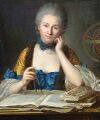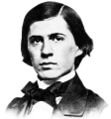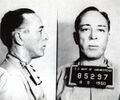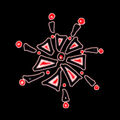Template:Selected anniversaries/September 10: Difference between revisions
No edit summary |
No edit summary |
||
| Line 19: | Line 19: | ||
||1863: Charles Edward Spearman born ... psychologist known for work in statistics, as a pioneer of factor analysis, and for Spearman's rank correlation coefficient. He also did seminal work on models for human intelligence, including his theory that disparate cognitive test scores reflect a single General intelligence factor and coining the term g factor. Pic. | ||1863: Charles Edward Spearman born ... psychologist known for work in statistics, as a pioneer of factor analysis, and for Spearman's rank correlation coefficient. He also did seminal work on models for human intelligence, including his theory that disparate cognitive test scores reflect a single General intelligence factor and coining the term g factor. Pic. | ||
File:Arthur Compton 1927.jpg|link=Arthur Compton (nonfiction)|1892: American physicist and academic [[Arthur Compton (nonfiction)|Arthur Compton]] born. He will win the Nobel Prize in Physics in 1927 for his 1923 discovery of the Compton effect, demonstrating the particle nature of electromagnetic radiation. | File:Arthur Compton 1927.jpg|link=Arthur Compton (nonfiction)|1892: American physicist and academic [[Arthur Compton (nonfiction)|Arthur Compton]] born. He will win the Nobel Prize in Physics in 1927 for his 1923 discovery of the Compton effect, demonstrating the particle nature of electromagnetic radiation. | ||
Revision as of 11:04, 10 September 2020
1749: Mathematician and physicist Émilie du Châtelet born. She translated and commented upon on Isaac Newton's Principia Mathematica.
1849: Mathematician and philosopher Charles Sanders Peirce born. He wil be remembered as "the father of pragmatism".
1892: American physicist and academic Arthur Compton born. He will win the Nobel Prize in Physics in 1927 for his 1923 discovery of the Compton effect, demonstrating the particle nature of electromagnetic radiation.
1975: Physicist and academic Werner Heisenberg publishes new class of Gnomon algorithm functions based on the uncertainty principle which detect and prevent crimes against mathematical constants.
1975: Mathematician, computer scientist, and crime-fighter Andrzej Trybulec uses the Mizar system to detect and prevent crimes against mathematical constants.
1976: Screenwriter and novelist Dalton Trumbo dies. He was blacklisted for refusing testify before the House Un-American Activities Committee (HUAC) in 1947; while blacklisted, he won Academy Awards for two films: Roman Holiday, attributed to a front author, and The Brave One under the pseudonym Robert Rich.
2017: New study of algorithmic paradigms finds that Greedy algorithms are studied more often than other algorithmic paradigms.
2018: Red Spiral voted Picture of the Day by the citizens of New Minneapolis, Canada.








